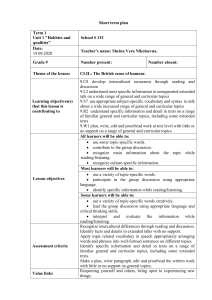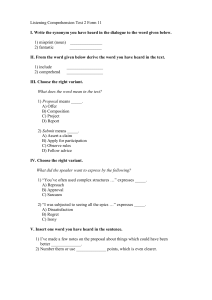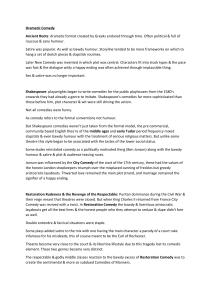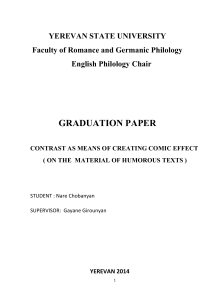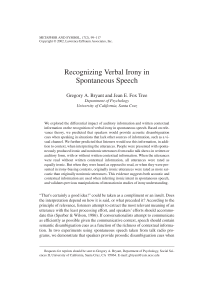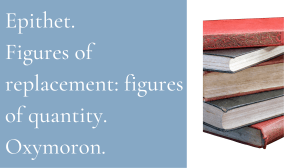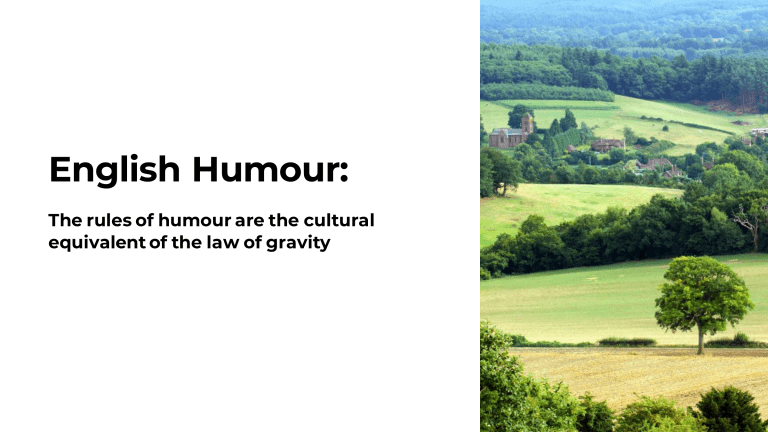
English Humour: The rules of humour are the cultural equivalent of the law of gravity HUMOUR RULES AND ENGLISHNESS 1 English humour is dominant and pervasive In English conversation, there is always an undercurrent of humour involving at least some degree of banter, teasing, irony, understatement, humorous self-deprecation, mockery or just silliness. 2 Global monopoly if not on humour itself, then at least on certain ‘brands’ of humour –such as wit and especially irony. 3 Humour and class "We are always laughing at class-related habits and foibles, mocking the aspirations and embarrassing mistakes of social climbers, and poking gentle fun at the class system". THE IMPORTANCE OF NOT BEING EARNEST RULE 1 Seriousness is acceptable, solemnity is prohibited. Sincerity is allowed, earnestness is strictly forbidden. Pomposity and self-importance are outlawed. 2 The English are probably more acutely sensitive than any other nation to the distinction between ‘serious’ and ‘solemn’, between ‘sincerity’ and ‘earnestness’. Seriousness is acceptable, solemnity is prohibited. Sincerity is allowed, earnestness is strictly forbidden. Pomposity and self-importance are outlawed. "Serious matters can be spoken of seriously, but one must never take oneself too seriously. The ability to laugh at ourselves, although it may be rooted in a form of arrogance, is one of the more endearing characteristics of the English". "The kind of hand-on-heart, gushing earnestness and pompous, Bible-thumping solemnity favoured by almost all American politicians would never win a single vote in this country – we watch these speeches on our news programmes with a kind of smugly detached amusement, wondering how the cheering crowds can possibly be so credulous as to fall for this sort of nonsense. When we are not feeling smugly amused, we are cringing with vicarious embarrassment: how can these politicians bring themselves to utter such shamefully earnest platitudes, in such ludicrously solemn tones?" "The same goes for the gushy, tearful speeches of American actors at the Oscars. English television viewers across the country all respond with the same finger-down-throat ‘I’m going to be sick’ gesture. You will rarely see English Oscar-winners indulging in these heart-on-sleeve displays – their speeches tend to be either short and dignified or self-deprecatingly humorous, and even so they nearly always managea to look uncomfortable and embarrassed. Any English thespian who dares to break these unwritten rules is ridiculed and dismissed as a ‘luvvie’." The ‘Oh, Come Off It!’ Rule 1 2 3 The tiniest sign that a speaker may be crossing the fine line from sincerity to earnestness will be spotted and picked up on immediately, with scornful cries of ‘Oh, come off it!’ The English have satire instead of revolutions English people now prefer sniping, pinpricking and grumbling from the sidelines to any sort of active involvement in defending or maintaining rights and freedoms. IRONY RULES "The English are ‘conceived in irony. We float in it from the womb. It’s the amniotic fluid . . . Joking but not joking. Caring but not caring. Serious but not serious." 1 - The playwright Alan Bennett Irony is endemic Like humour in general, irony is a constant, a given, a normal element of ordinary, everyday conversation. 2 In a state of readiness for humour "We do not always say the opposite of what we mean, but we are always alert to the possibility of irony". The Understatement Rule 1 2 3 A truly horrific experience must be described as ‘well, not exactly what I would have chosen’ Strict prohibitions on earnestness, gushing, emoting and boasting require almost constant use of understatement - feign dry, deadpan indifference English humour isn’t actually very funny It is humour, but it is a restrained, refined, subtle form of humour. At best, a well-timed, well-turned understatement only raises a slight smirk. The Self-deprecation Rule • Not genuine modesty but saying the opposite of what intended people to understand. • Embarrassment of success and prestige by making a self-deprecation joke out of it all, as is the custom. "My fiancé is a brain surgeon. When we first met, I asked what had led him to choose this profession. ‘Well, um,’ he replied, ‘I read PPE [Philosophy, Politics and Economics] at Oxford, but I found it all rather beyond me, so, er, I thought I’d better do something a bit less difficult.’ I laughed, but then, as he must have expected, protested that surely brain surgery could not really be described as an easy option. This gave him a further opportunity for self-deprecation. ‘Oh no, it’s nowhere near as clever as it’s cracked up to be; to be honest it’s actually a bit hit-or-miss. It’s just plumbing, really, plumbing with a microscope – except plumbing’s rather more accurate.’ It later emerged, as he must have known it would, he had entered with a scholarship and graduated with a First. ‘I was a dreadful little swot,’ he explained.
